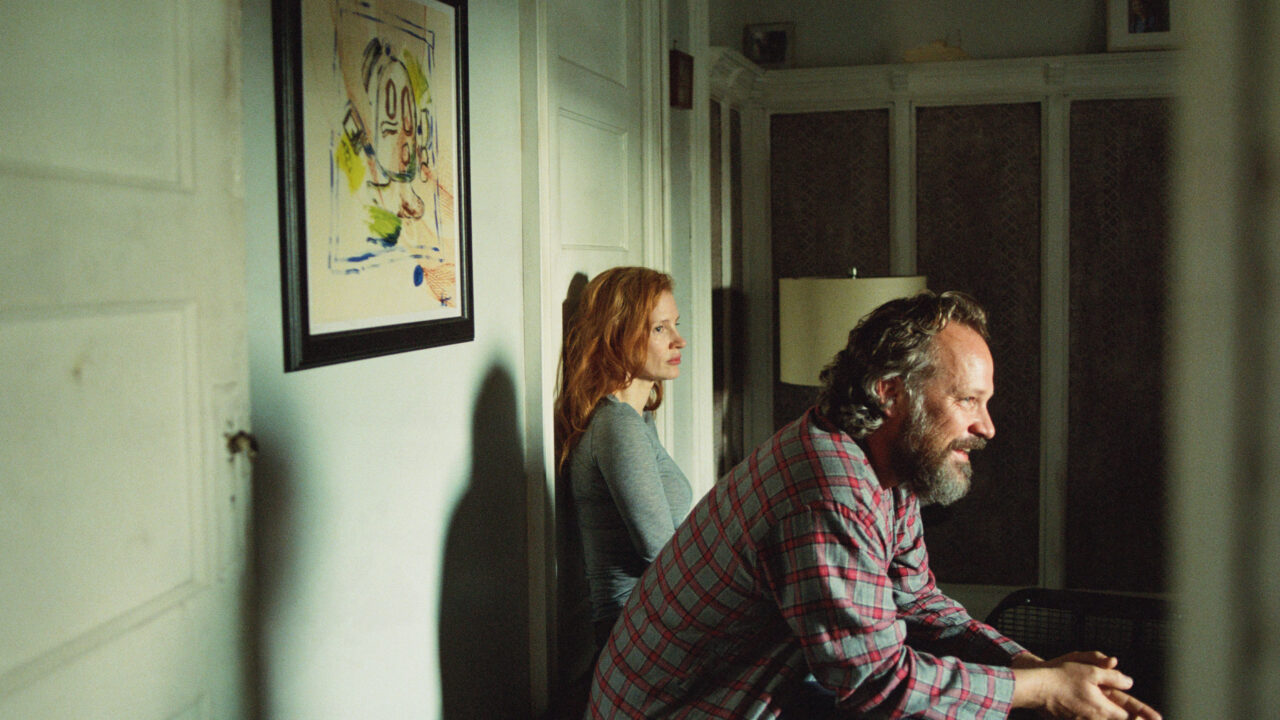The Mind and Body Keep the Score
Michel Franco’s new romantic drama is a stunning performance piece about instinct and desire. Jessica Chastain and Peter Sarsgaard in "Memory." Photo courtesy of Ketchup Entertainment.
Jessica Chastain and Peter Sarsgaard in "Memory." Photo courtesy of Ketchup Entertainment.
“Memory,” Michel Franco’s calm but keenly observational 100-minute drama, is now in cinemas. Jessica Chastain plays Sylvia, a mother and social worker in New York, whose traumatic past manifests as excess caution. Peter Sarsgaard — who won the Volpi Cup for Best Actor after the movie’s Venice Film Festival premiere — plays Saul, a middle-aged man with early onset dementia, whom Sylvia may have known in high school. Their coincidental meeting sets off a domino effect involving confrontations with difficult truths, an unconventional romance and familial concerns on either side. Through it all, the film centers the ways the body keeps the score.
Franco introduces his story through close-ups of Alcoholic Anonymous meeting attendees pouring out their hearts and souls. The camera eventually lands on Sylvia, more reserved than her group mates, who doesn’t seem to want the attention. It’s the 13th anniversary of her sobriety, and her teenage daughter Anna (Brooke Timber) is along to celebrate and support her. This is the first and last time Franco’s framing is this tight in terms of proximity, intimacy, safety. Once out in the world, his camera — courtesy of cinematographer Yves Cape — holds back when capturing Sylvia, including in her own home, with its litany of door locks, as though she were living at a remove from her own senses.
When she makes the decision to venture out to her high school reunion, along with her younger sister Olivia (Merritt Wever), Chastain’s guarded body language paints a vivid picture of her past even before we learn the gloomy details of her childhood. Her arms are crossed, her shoulders stiff. Her eyes dart subtly around the room as she avoids drawing attention. Franco never aestheticizes this sense of paranoia; we aren’t meant to feel as Sylvia does. Rather, he lets her exist in wide unbroken shots in which scenes play out in full. This sense of distance and disconnect affords the viewer a sense of comfort, but this too is quickly broken, and intruded upon, when Sylvia is approached and followed home by Saul. When she finds him outside her apartment building the next morning, cold, alone and barely responsive, her dueling instincts as a social worker and a survivor of sexual assault come into conflict, a scene which Chastain plays as though she were pressing a loose lid against an exploding pressure cooker.

The former instinct wins out, and she helps Saul get home to his protective brother Isaac (Josh Charles) and his friendly niece, Sara (Elsie Fisher). This encounter portends an intriguing tale of how memory manifests — both physically and emotionally — and the way it lives on through instincts and desires, when Isaac hires Sylvia to look after Saul just as she begins unraveling in her personal life. There are uncertainties about what Sylvia knows in her bones and what Saul’s mind has forgotten, and where these two mysteries meet forms the story’s initial lightning rod, yielding a discomforting tale of past traumas living on in the present.
But despite the mystery of Sylvia and Saul’s past connection being resolved in the narrative (quickly and surprisingly), the questions of what exactly Sylvia recognizes in Saul, and of why Saul was drawn to Sylvia despite his failing memory, still loom. They become the narrative linchpin of the duo’s blossoming romance, which takes the form of uncanny comfort. These are people who are no longer certain of their senses, but they find an ounce of certainty in each other’s company, despite the ethical implications therein. (Sylvia is effectively Saul’s nurse). Rigorous family drama unfolds on either side, concerning Sylvia’s personal relationships and Saul’s self-sufficiency — or his increasing lack thereof — with Chastain and Sarsgaard’s respective performances forming roadmaps to increasingly labyrinthine emotions, despite the story’s straightforward romantic plot.
Chastain’s resolve begins to transform as Sylvia lets her guard down. Sarsgaard’s uncertainty, in contrast, takes on new forms as the duo deepen their involvement. Though she bristles at the idea of letting her teenage daughter have a social life, Sylvia slowly struggles with her convictions, for better or worse, while Saul’s foggiest moments go from frustrated outbursts to smiles and shrugs. It’s as though both characters are growing more accustomed to and accepting of a malformed daily existence, so long as they exist together. The adage of romantic love being an act of finding one’s “other half” is never more apt and poignant than in “Memory.” Not every person watching the film will have experienced PTSD or dementia, but most of us are accustomed to the experience of doubt, in romantic and family matters, throwing one’s equilibrium into disarray. Chastain and Sarsgaard, through their detailed and lived-in performances, synthesize these uncertainties into an unfamiliar, gentle, deeply felt romantic saga.
Your support matters…Independent journalism is under threat and overshadowed by heavily funded mainstream media.
You can help level the playing field. Become a member.
Your tax-deductible contribution keeps us digging beneath the headlines to give you thought-provoking, investigative reporting and analysis that unearths what's really happening- without compromise.
Give today to support our courageous, independent journalists.
You need to be a supporter to comment.
There are currently no responses to this article.
Be the first to respond.